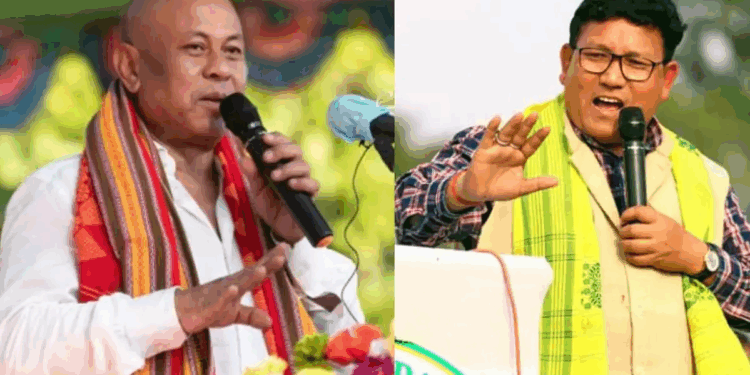The Bodoland Territorial Council (BTC election) scheduled for 2025 is a significant event in Assam’s political landscape. This election, involving 40 constituencies, will see the participation of two major regional political parties of the Bodoland Territorial Region (BTR): the Bodoland People’s Front (BPF) and the United People’s Party Liberal (UPPL). Ahead of the election, the All Bodo Students’ Union (ABSU) initiated efforts to unite these two parties to prevent the division of Bodo votes and strengthen their collective political influence. However, the BPF’s announcement of candidates for 22 constituencies, led by Hagrama Mohilary, has cast doubts on the possibility of this unity.
ABSU’s Efforts for Unity
The All Bodo Students’ Union (ABSU), a prominent organization advocating for Bodo interests, has been working for months to foster unity between the BPF and UPPL. With the goal of consolidating Bodo political power and avoiding vote fragmentation, ABSU planned a national convention to be held by August 15 to facilitate discussions between the two parties. A delegation led by ABSU president Dipen Boro met with BPF leader Hagrama Mohilary, who initially expressed agreement on the idea of unity. However, subsequent actions by the BPF have raised questions about their commitment to this cause.
ABSU’s primary objective was to prevent vote splitting among the Bodo community, ensuring a unified political front in the BTC election. However, the BPF’s premature candidate announcement has significantly hindered these efforts.
BPF’s Candidate Announcement and Its Impact on Unity
On July 4, at a press conference in Daodhara, Baksa district, the BPF announced its candidates for 22 constituencies, with Hagrama Mohilary himself contesting from the Debargaon constituency. This move created a political stir, as it came at a time when discussions about a BPF-UPPL alliance were ongoing. The announcement has been perceived as a strategic decision by the BPF to assert dominance and preempt any collaborative efforts.
UPPL president and BTC Chief Executive Member Pramod Boro criticized this early announcement, suggesting that Hagrama Mohilary’s decision was driven by fears of defection within the BPF and political miscalculations. Pramod Boro argued that if the BPF were genuinely interested in unity, they would have engaged in open discussions rather than unilaterally announcing candidates. This move has significantly diminished the prospects of a BPF-UPPL alliance.
Hagrama Mohilary’s Formula and UPPL’s Rejection
Hagrama Mohilary proposed a formula for unity. He said, suggesting that the UPPL relinquish its control over the BTC government and agree to contest 20 constituencies each with the BPF. He stated, “If UPPL leaves the government, we can contest 20 seats each and unite.” However, Pramod Boro rejected this proposal, calling it impractical despite its appealing nature. He emphasized that genuine unity would require both parties to engage in transparent negotiations.
Mohilary further questioned ABSU’s approach, asking whether they sought unity as a Bodo community or as political parties. He remarked, “If ABSU is thinking of unity as a Bodo community, we are already united. But as parties, we are separate. ABSU talks about unity, but what is the formula?” This statement highlights the underlying tensions and differing visions between the two parties.
Influence of State Politics
Assam Chief Minister Dr. Himanta Biswa Sarma has also played a significant role in the BTC election context. During his campaign in BTR, he endorsed the idea of a BPF-UPPL alliance, stating that such unity would benefit the Bodo community.
Additionally, the Bharatiya Janata Party (BJP), a key ally of the UPPL in the state government, has decided to contest the BTC election independently, further complicating the political dynamics. This decision poses new challenges for both the BPF and UPPL, as it increases the likelihood of a triangular contest.
BPF Was The Single Largest Party in 2020’s BTC Election
The BPF, under Hagrama Mohilary’s leadership, governed the BTC from 2003 to 2020, winning multiple elections. However, in the 2020 BTC election, a coalition of the UPPL, BJP, and Gana Suraksha Party (GSP) defeated the BPF, ending its 17-year rule. The BPF secured 17 seats, emerging as the single largest party, but failed to achieve a majority. The UPPL won 12 seats, and the BJP secured 9, allowing the coalition to form the government under Pramod Boro’s leadership.
This shift marked a significant change in BTR’s political landscape, with the UPPL establishing itself as a formidable force. The 2025 election is seen as an opportunity for the BPF to reclaim power, while the UPPL aims to consolidate its position.
Election Schedule and Political Environment
The State Election Commission is expected to announce the BTC election dates in the third week of August, with the polls likely to be held in the third week of September. The BPF’s early candidate announcement signals its aggressive strategy to dominate the electoral race. Hagrama Mohilary’s move has been described as a political masterstroke by some, setting the stage for a highly competitive election.
For the UPPL, this situation presents both challenges and opportunities. However, the BJP’s decision to contest independently in the BTC election could split votes, complicating the UPPL’s strategy.
The 2025 Bodoland Territorial Council election is a critical juncture for the Bodo community’s political future. Despite ABSU’s efforts to unite the BPF and UPPL, the BPF’s premature candidate announcement has significantly undermined these prospects. Hagrama Mohilary’s proposed formula for unity and its rejection by Pramod Boro highlight the deep-seated political rivalry between the two parties. The BJP’s independent participation further complicates the electoral landscape, increasing the likelihood of a three-way contest. While the need for unity to safeguard Bodo interests remains paramount, the current dynamics suggest that the election will be marked by intense competition rather than collaboration. The outcome will depend on how BTR’s voters respond to these developments, shaping the region’s political trajectory.





